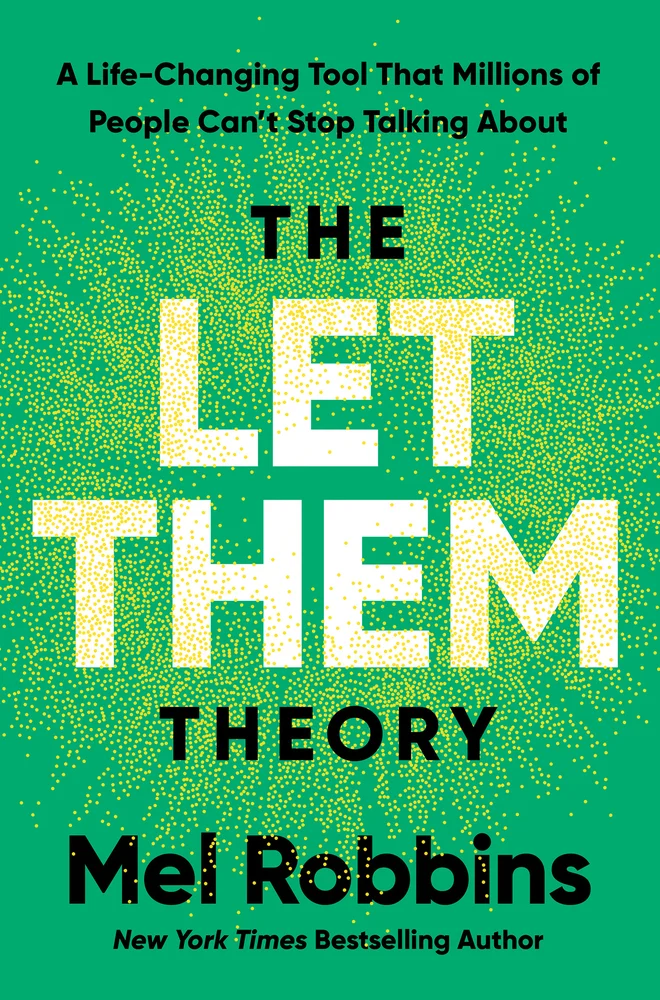Get Lit with Mel Robbins: An Exclusive Excerpt from “The Let Them Theory”
Who
Mel Robbins is a New York Times bestselling author and host of one of the top-ranked podcasts in the world. She’s a world-renowned expert on mindset, motivation, and behavior change.
What
The Let Them Theory is a step-by-step guide on how to stop letting other people's opinions, drama, and judgment impact your life. These two simple words will set you free from the exhausting cycle of trying to manage everything and everyone around you.
Why
Mel Robbins says, “I shared the “Let Them Theory” on social media, and it went CRAZY VIRAL. 15 million views, 11,000 comments. Today, it’s your turn to learn this mindset trick. I’ve been using this technique for awhile, so I know firsthand how powerful it is.”
& We
...chose The Let Them Theory as our Get Lit pick because these two simple words will allow you to take control of your life—no matter what others choose to do. Enjoy!
It’s an SP+ Double Feature!
Next week Mel Robbins is sitting down with Maria for a brand-new episode of Above the Noise
Here’s Your Exclusive Excerpt
Getting Started: Let Them + Let Me
Not too long after I discovered the Let Them Theory, I was sitting on my couch, scrolling through social media, when I saw a photo of an old friend of mine. She looked fantastic. I glanced down to read the caption, where she was describing an amazing weekend she’d just had with her friends. And I could tell she meant it.
As I stared at the photo, I admired how tan, happy, relaxed, and refreshed she looked. And I found myself thinking, Wow. I could really use a weekend like that. Hell, I could just use a spray tan. I started swiping through the carousel of photos and realized I was seeing photo after photo that showed an epic girls' weekend away.
Brunch. Dancing. Shopping. Laughter. Swimming. Cocktails.
Then I took my thumb and my pointer finger and pinched so I could zoom in for a closer look at the group shot, only to realize that I knew every single one of the women smiling back at me on my screen. My heart sank. My friends had all gone away together.
You know that awful feeling in your stomach, the one that hits you when you realize you’ve been left out. It’s like a punch. You try to brush it off, telling yourself it's not a big deal, but the hurt is real. I should have put my phone down, but I didn’t.
I looked through those photos one by one—seeing a girls' trip through the eyes of the very same women who I had raised my kids with in our small suburban town—I tried not to let it bother me. But it did.
My mind started filling in all the details. I imagined how much fun they were having and how close they had become. I had known these women for years. We bonded over barbecues, carpools, soccer games, date nights with our spouses, and hard conversations about parenthood. So, naturally, I started to spiral.
I’m talking: Full. Stalker. Mode. I sat there, on that same spot on the couch, and felt it meld to my back as I poured over each and every one of their accounts. Five minutes before, I had been perfectly fine. But now? Well now, I found myself feeling the familiar swirl of emotions take over: rejection, insecurity, confusion. When did they plan this? Why wasn’t I included? Why am I never invited anywhere? When was the last time I went away with friends?
As I kept on scrolling through their photos, turning those questions over and over in my head, Chris walked into the room, took one look at me, and asked, “What’s wrong?”
I sighed, and told him the truth: “I just found out a bunch of my girlfriends went away for the weekend on a really fun trip. I obviously wasn’t invited.”
“That sucks,” he said.
“Maybe I did something wrong,” I said. “Maybe they're mad at me.”
He crossed his arms and asked me, “Why do you care so much?”
I looked at him.
“It’s not like you’re close friends with them anymore, Mel.”
He was right. I knew he was. But I still felt this urge to reach out and smooth things over. I’m sure you’ve experienced this before. You find out that you weren’t included in something, and all you want is some kind of reassurance that there wasn’t something you had done wrong.
Because honestly I didn’t know. And if you are anything like me, when it happens you immediately assume that you have done something wrong. As I sat there on the couch wracking my brain for any evidence as to why I wasn’t included, I couldn’t think of anything. And that made me even more nervous.
I mean, sure, we had known each other for years. We had gone through early motherhood together, we had lived a lot of life together, and I really liked everyone who was on that trip. But, at the same time, I hadn’t really spent time with them as a group in a long, long time. I had seen them around town at large gatherings, but I hadn’t invested in those individual friendships; and I hadn’t planned anything fun or reached out to them recently either. Intellectually, I knew this, but emotionally I was devastated. I felt like I was back in middle school again: the one left out of the sleepover, the one who didn’t make the team, or who wasn’t part of the inside joke.
Putting the Theory into Practice
I felt myself wanting to reach out to them and fix it. Call, text. Anything to make the anxiety go away. That’s when those two words came in and saved me from myself. Let Them.
The old me would have obsessed over this for days. For weeks, really. My emotions would have gotten the best of me. I would have tried to pretend it didn’t bother me. I would have tried to convince myself that I didn’t care. I would have tried to rationalize it over and over in my mind. I would have turned my friends into villains to make me feel better. All of which would have made me feel worse and withdraw even more from these women who I genuinely liked.
But that didn’t happen. It bothered me for about 10 minutes. As soon as I said Let Them, I felt a little better. The second time I said it, I felt a little better. The third, fourth, fifth, sixteenth time, thirtieth time I said it. . . I felt a little better.
I will be honest with you: In these types of painful situations, you’re going to have to keep saying Let Themover and over, because when something hurts, the hurt doesn’t just disappear. It rises up again and again. So don’t be surprised when you find yourself having to repeat Let Them again and again.
Let Them go on the trip. Let Them take the weekend together. Let Them have their fun without you.
At first, those words felt like a rejection. Like I was giving in. But then I realized something important: Let Themwasn’t about giving in. It was about releasing myself from the control I never had in the first place. Because here’s the truth—no matter how much I tried to analyze the situation or how many ways I could try to control or fix it, nothing I did would change what had happened. Their choice to go away didn’t have to make me feel bad, but my attempts to control the situation were making me feel horrible.
Let Them.
And just like that, the knot in my chest began to loosen. The pressure to “fix” the situation faded, and I realized something that changed everything: Their weekend away had nothing to do with me.
It wasn’t personal. They weren’t plotting against me. They weren’t making a statement about my worth. And even if they were? Let Them.

Excerpted from THE LET THEM THEORY by Mel Robbins, to be published on December 24, 2024. Copyright © 2024 by Mel Robbins.
What do you think of the "Let Them Theory"? Can you think of a recent situation in your life that would have benefited from this perspective?
Please note that we may receive affiliate commissions from the sales of linked products.



